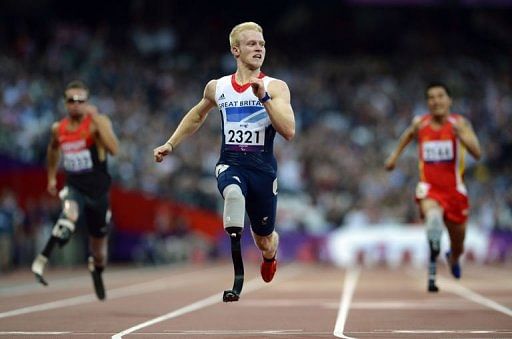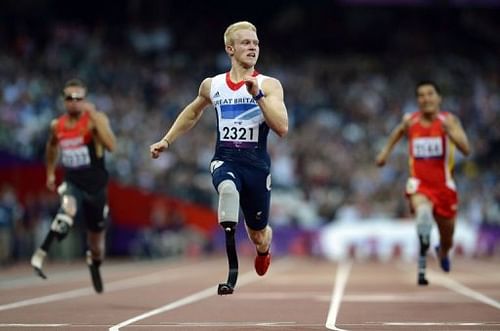
Peacock puts rivals on notice for 100m final
LONDON (AFP) –

Britain’s Jonnie Peacock powers home to win the men’s 100m T44 heat 1 during the athletics competition at the London 2012 Paralympic Games at the Olympic Stadium in east London.
Britain’s world record holder Jonnie Peacock on Wednesday fired a warning shot to his 100m rivals, including “Blade Runner” Oscar Pistorius, as he equalled the Paralympic record to qualify for the T44 final.
The 19-year-old, who lowered the world best to 10.85sec in June, sprinted clear of the field in his heat to clock 11.08sec.
Jerome Singleton, of the United States, also qualified in 11.46sec. Singleton, a former National Aeronautics and Space Administration (NASA) intern, won silver in Beijing.
Defending champion Pistorius, making a return to the track for the first time since his sensational defeat in the 200m on Sunday, ran a season’s best of 11.19sec to win his heat ahead of US sprinter Blake Leeper, who ran 11.46sec.
Brazilian Alan Oliveira, who took Pistorius’ 200m title, and China’s Lui Zhiming qualified as the two-fastest losers in 11.56sec and 11.84sec respectively. Lui’s time was a new Asian record.
Peacock, 19, lost his right leg below-the-knee to meningitis at the age of five, and is coached by Dan Pfaff, who coached Canada’s Donovan Bailey to Olympic 100m gold in Atlanta in 1996.
The T44 final — billed by organisers as the showpiece straight sprint of the Games, as all eight finallists are capable of running under 11secs — takes place on Thursday evening.
Pistorius, known as the ‘Blade Runner’ because he runs on carbon fibre prostheses, has warned that winning gold again will be tough because of the progress made in the event — and because it is not his favoured event.
“It’s not really my event,” he said last week.
“As Jonnie (Peacock) and those guys focus on the 100, my focus is on the 400, on the complete opposite side of the spectrum when it comes to sprinting.”
Even more focus was on Pistorius after his outspoken claims that he was unable to compete with the stride length of his rivals in the 200m final because the other competitors were “a lot taller”.
Pistorius, the first double-amputee to compete in the Olympics and the Games’ biggest star, said he had raised the issue with the International Paralympic Committee (IPC) but it had fallen “on deaf ears”.
He later apologised for the timing of the comments but not the substance.
Swapping blades mid-competition is currently against the rules.
The IPC have agreed to meet the sprinter to discuss his concerns but insisted that all eight finalists’ prostheses, which have to be proportional to body length, were within the rules and there were no infringements.
His comments have re-opened the debate about the fairness of athletic prostheses.
Pistorius himself had to fight to convince the International Association of Athletics Federations (IAAF), which governs able bodied athletics, that his J-shaped “Cheetah” blades did not give him an advantage.